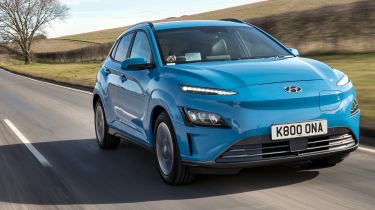Hyundai confirms price reductions after UK government cuts plug-in grant
Hyundai, Nissan, BMW, Peugeot, Kia, Vauxhall, MG, Tesla and Citroen have all adjusted their electric-car pricing to ensure models remain eligible for plug-in grant

Hyundai has become the latest manufacturer to adjust its pricing in response to the UK government's decision to cut the maximum amount of the plug-in car grant from £3,000 to £2,500 and reduce the eligibility threshold to £35,000 from £50,000 threshold. The Ioniq Electric hatchback is now priced at £32,995 and £34,995 pre-grant in Premium and Premium SE trim respectively, for post-grant prices of £30,495 and £32,495.
The Kona Electric (pictured above) with the smaller 39kWh battery is now priced at £30,395 and £31,745 in SE Connect and Premium trims, for post-grant prices of £27,895 and £29,245 respectively. The larger-battery 64kWh Kona Electric comes in at £34,995 in Premium trim, for a post-grant price of £32,495, while the Premium SE is £37,145 and therefore no longer eligible for the grant.
Nissan, meanwhile, reduced the prices of all its Leaf models in response to the grant reduction. The entry-level 40kWh Leaf Acenta now costs £25,955, after being reduced by £1,350, while other 40kWh models had a price cut of around £650. The highest-spec 62kWh Nissan Leaf e+ now costs £30,445 in N-Connecta trim and £32,445 in Tekna guise, with their prices being reduced by £5,250 and £5,265 respectively.
Kia introduced a new trim level to the e-Niro electric SUV range so buyers who want car with the larger 64kWh battery can still get the grant. The e-Niro 2 Long Range costs £32,445 post-grant and is now the second-cheapest e-Niro you can buy, after the 2 Mid Range with the smaller 39kWh battery, which costs £30,345 after the grant. The more expensive e-Niro 3 and 4+ trim levels (both of which are offered only with the larger 64kWh battery) are no longer eligible for the grant, with starting prices of £37,100 and £39,395 respectively.
Vauxhall announced reductions in the price of its Mokka-e and Vivaro-e Life electric models for the same reason, lowering the price of the Mokka-e SE Premium to £33,040 before the grant and of the range-topping Mokka-e Launch Edition to £34,995 before the grant, while the Vivaro-e Life Edition now starts at £34,995 before the grant.
BMW also reduced the price of the i3 supermini by £5,885 from £39,690 to £33,805, and cut the price of the performance-orientated i3s by £7,415 from £42,220 to £34,805. Peugeot reduced prices in its e-2008 electric SUV range to keep its biggest-selling trim levels eligible for the grant.
Citroen announced that all versions of its e-C4 electric family car remain eligible for the grant, having reduced the price of the e-C4 Shine Plus trim level by £550 to ensure it comes under the threshold. And while MG's ZS and 5 electric models remain eligible for the grant, the Chinese-owned brand has committed to making up the £500 difference between the old and new grant level for any orders placed in March 2021.
Due to the UK government’s decision, a number of electric cars are no longer eligible for the grant, including the Polestar 2 and Ford Mustang Mach-E. Chief executive of the Society for Motor Manufacturers and Traders (SMMT) Mike Hawes criticised the UK government’s decision, saying it was the “wrong move at the wrong time.” The Department for Transport (DfT) defended its decision, saying the changes mean the money available for the grant scheme should last longer.
